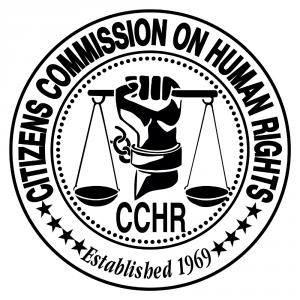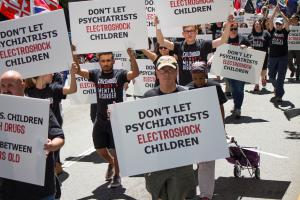CCHR Warns of Treatments That Can Induce, Not Prevent Suicide

CCHR’s mission is to eradicate abuses committed under the guise of mental health and enact patient and consumer protections.
Mental health watchdog says people in need of help are put at risk by the treatments the FDA approves including antidepressants and electroshock.
Jackson died 10 years ago, receiving a lethal dose of propofol that his doctor, Conrad Murry prescribed for insomnia. Murray was convicted of involuntary manslaughter in 2011. [1]
In the depression study, only 10 subjects were used to claim “success,” measured by half maintaining “better moods for three months.” Arguably, the other half failed to experience this and none were cured. The researchers don’t know how propofol “works” for depression, but theorize it “may be triggering the brain to reorganize itself.” [2] However, depression, bipolar—all mental disorders—cannot be physically identified in the brain, not even at autopsy.
Propofol is claimed to have fewer side effects than brain stimulations such as electroshock treatment, which has side effects of “confusion and memory loss,” [3] brain damage and death. According to a review of propofol deaths published in the Journal of the Louisiana State Medical Society, “Propofol is a dangerous drug with an evident abuse potential which often results in fatalities.” [4]
The FDA and American Psychiatric Association claim the merits of electroshock over antidepressants or in combination, although there are no clinical trials proving ECT’s safety and efficacy. Serious adverse effects are minimized.
Charles Kellner, professor of psychiatry and director of ECT services at Icahn School of Medicine, Mount Sinai recently asserted in Psychiatric Times that adverse effects such as the cognitive damage from ECT isn’t a “safety” concern but, rather, a “tolerability” issue.
Astoundingly, he claimed that “refusing ECT because of concerns about memory loss is equivalent to refusing cancer chemotherapy because of concerns about hair loss.” His analogy is that after chemotherapy “most of the hair grows back” and with ECT, “most of the memories return.” Yet patients attest to permanent memory loss of important life events as a result of ECT—hardly a comparison to temporary hair loss.
Tests can confirm cancer—found in cell or tissue samples under a microscope and by imaging tests. There are no tests or imaging scans to confirm depression physically existing in the brain or body. Chemotherapy can prevent cancer cells from growing and spreading by destroying or stopping them from dividing. Electroshock cannot prevent “depression cells” from spreading because they don’t exist.
ECT is not “life-saving” and could induce suicide:
• A coroner’s inquest determined that involuntary ECT did not prevent but may have led to a patient’s death after a suicide attempt. [5]
• A UK coroner investigating the death of mother in 2016 found that the ECT led to a “deterioration in her mental health...culminating in her decision to commit suicide.” [6]
• Researchers reviewed more than 90 ECT studies since 2010 determining: “There is still no evidence that ECT is more effective than placebo for depression reduction or suicide prevention.” [7]
The history of the approval and prescription of dangerous treatments for those labeled mentally disordered is one of abject failure, CCHR says.
Dr. Allen Francis, former head of APA’s fourth edition of its diagnostic manual, said, “We use terms like treatment-resistance and treatment-refractory, but this is merely an admission of our failure to have a solution....We persist in treatment, usually by giving whatever has failed previously in more dosage or by adding new treatments that have little chance of success, but a high risk of side effects.” [8]
CCHR has documented 36 FDA-approved drugs since the 1970s that were recalled due to adverse reactions. Of these, five were psychiatric drugs. Fourteen were linked to over 58,300 deaths.
Atypical antipsychotics have been linked to 15,000 deaths in nursing homes, according to congressional testimony. [9] A New England Journal of Medicine study found the rate of sudden cardiac death doubled for those taking atypical antipsychotics; there were three such deaths per year for every 1,000 patients taking them. [10] A study found that antidepressants were estimated to cause 10 to 44 deaths out of 1,000 people over a year. [11] Yet FDA has approved the use of antipsychotics as adjuncts to antidepressants—combining two potentially lethal drugs.
Jan Eastgate, international president of CCHR, urges consumers to be better informed of psychiatric treatments, warning they may be nothing more than physical and mental health assault—a terrible betrayal for people seeking help.
For more information on the adverse effects of psychiatric drugs or to sign CCHR’s Petition to Ban ECT please contact CCHR.
About CCHR: Initially established by the Church of Scientology and renowned psychiatrist Dr. Thomas Szasz in 1969, CCHR’s mission is to eradicate abuses committed under the guise of mental health and enact patient and consumer protections. L. Ron Hubbard, founder of Scientology, first brought psychiatric imprisonment to wide public notice: “Thousands and thousands are seized without process of law, every week, over the ‘free world’ tortured, castrated, killed. All in the name of ‘mental health,’” he wrote in March 1969. For more information visit www.cchrflorida.org
Sources: https://www.cchrflorida.org/anesthetic-that-killed-michael-jackson-used-as-experimental-depression-drug-cchr-warns-of-treatments-that-can-induce-not-prevent-suicide/
Diane Stein
Citizens Commission on Human Rights of Florida
+1 727-480-5035
email us here
Visit us on social media:
Facebook
Twitter
LinkedIn
Electroconvulsive "Therapy" —The Facts about ECT
Legal Disclaimer:
EIN Presswire provides this news content "as is" without warranty of any kind. We do not accept any responsibility or liability for the accuracy, content, images, videos, licenses, completeness, legality, or reliability of the information contained in this article. If you have any complaints or copyright issues related to this article, kindly contact the author above.


